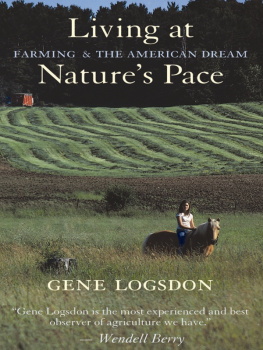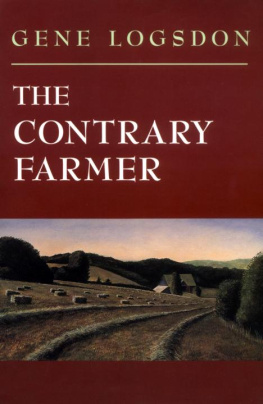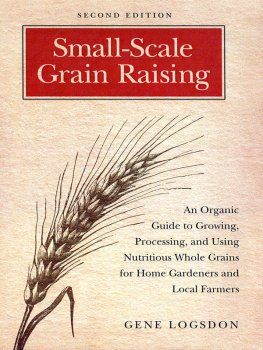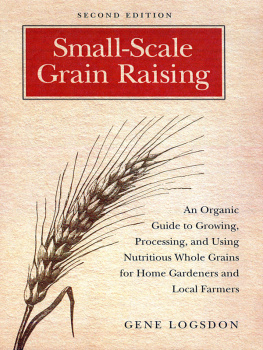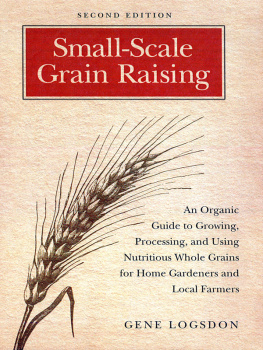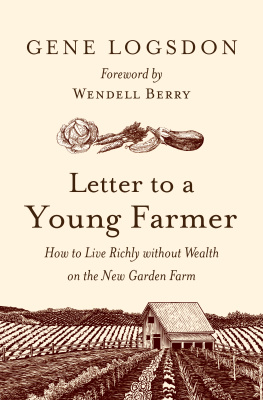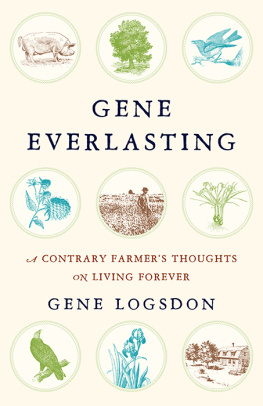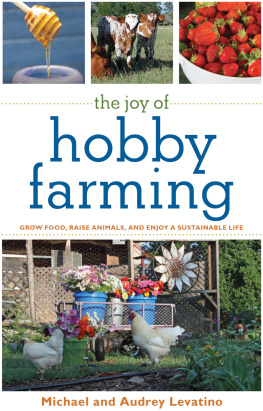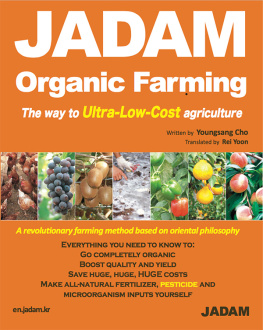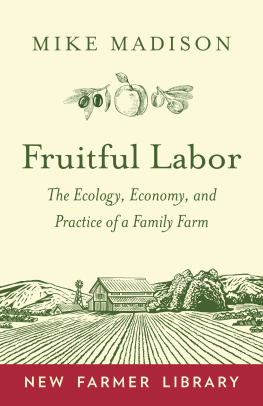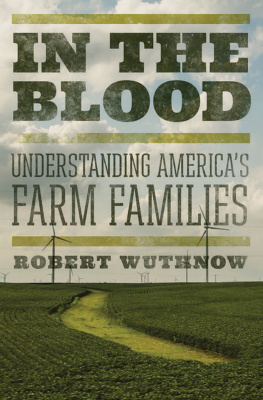Dear Mr. Logsdon,
I have just finished reading your book, At Nature's Pace, again.... I turn to it much as one would to an old friend, for that is what it has become since I first discovered you on a bookshelf in Pittsburgh, Pennsylvania, in early 1993. This book has since been joined by others penned by you, earlier and later. From all I derive the same freshness, honesty, and passion.
I write this letter as a thank you, since you articulate what I could not, and you have given voice to the ruminations of my mind over the past decade. The elegant blend of a small, diversified farm supplemented with off-farm income awaits implementation in twenty-two months, when the United States Army no longer controls my whereabouts.
Having grown up in Lancaster County, Pennsylvania, I always gave great respect to those involved with farming and the farming community, and it wasn't until I purchased your book in 1993 that I encountered opinion to the contrary. While I read your book in the student lounge at the University of Pittsburgh law school, several acquaintances guffawed at the notion that the American Dream could involve something as "simple" and "unskilled" and "mundane" as farming. That summer I was married, and as wedding favors my wife and I gave white oak seedlings, sprouted from the acorns dropped by the trees in front of the law school. Those who had earlier mocked my reading material thanked me at the reception for the pretty seedlings. I just smiled.
The Army has sent me to Missouri, and now to New York. I never realized how good the soil in Lancaster was, until I had to contend with what passes for soil in the Ozarks and West Point. It also saddens me to see Lancaster slowly paved over, as some of the finest non-irrigated farmland in the world is lost to urban sprawl. I wonder if I can return home. A mall and retirement community now sit on my best friend's cornfield. The stars of the night sky are dimmed by the competition from ambient lighting on the ground. In two years my family will need to decide where to put down roots, as wanting to be rooted to a place is the primary reason I am leaving the service. Your chapter, "Knowing One's Place," reminded me of what it is I want to do with the time I am allotted on this earth. As we begin our search, I thought I should revisit the book that caused me to begin the journey I am currently on. It was reassuring to finish the book with the same feelings I had when I first read it.
As my two daughters grow I want them to know of their connections to both the ground they walk on and the community that surrounds them. I want to participate in their growth, and provide them with more than the ability to accumulate possessions. And I am pleased that I have found voices to which I can relate. First you, then Wendell Berry, Marty Strange, Noel Perrin, and Donald Hall, to name a few. I am not one to write letters, let alone to folks I have never met, but I felt compelled to write. I cannot express my level of gratitude.
Sincerely,
Jeff Hatch
Living at Nature's Pace
FARMING AND THE AMERICAN DREAM
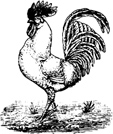
Gene Logsdon
CHELSEA GREEN PUBLISHING COMPANY
White River Junction, Vermont
Copyright 1994, 2000 Gene Logsdon.
Designed by Cheryl L. Cipriani and Suzanne Church.
All rights reserved. No part of this book may be transmitted in any form by any means without permission in writing from the publisher.
Printed in the United States.
Originally published in 1993 by Pantheon Books, a division of Random House. Revised edition published by Chelsea Green in February, 2000.
The following essays were originally published in various publications as indicated: "Green Fields, Red Ink": Ohio Magazine (April 1986); "For Amber Waves of Green": Ohio Magazine (March 1980); "Our Hidden Wound": Farm Journal (March 1992); "The Failure of Agricultural Education": Ohio Magazine (May 1992); "Traditional Farming" from Meeting the Expectations of the Land, ed. by Wes Jackson, Wendell Berry, Bruce Colman (North Point Press, 1984); "Knowing One's Place": Draft Horse Journal (Spring 1982); "The Future: More Farmers, Not Fewer": Whole Earth Review (Spring 1989): "Rural Rides Revisited," published in slightly different form in Draft Horse Journal (Winter 1989-90); "Amish Economics": Whole Earth Review (Spring 1986) and Orion (Spring 1988); "A Horse-Drawn Economy": Draft Horse Journal (Winter 1988-89); "The Barn Raising": Ohio (May 1983); "Not So Friendly Persuasion": Ohio (October 1983); "A Patriarch Passes": Ohio (July 1988); "A Woodcutter's Pleasures": Organic Gardening (October 1988); "The Pond at the Center of the Universe": Ohio (June 1991); "My Wilderness": Organic Gardening (February 1980); "The Wheel of Life Turns Round and Round," published in a slightly different form in The Land Report, ed. by Wes Jackson (The Land Institute, Spring 1999); "Going to Market on a Warm Day in November": Country Journal (November/December 1999); "The Folly of Trying to Repress the Agrarian Impulse" from The Land Report, ed. by Wes Jackson (The Land Institute, Fall, 1999).
Library of Congress Cataloging-in-Publication Data
Logsdon, Gene.
Living at nature's pace : farming and the American dream / Gene Logsdon.-- 1st
Chelsea Green ed.
p. cm.
Originally published: New York : Pantheon Books, 1994.
eBook ISBN: 978-1-60358-049-6
1. AgricultureUnited States. 2. AmishUnited States. 3. Country lifeUnited
States. I. Title.
S441 .L613 2000
630'.973-dc21 99-057305
Chelsea Green Publishing Company
Post Office Box 428
White River Junction, VT 05001
(800) 639-4099
www.chelseagreen.com
Dedicated to Andy Reinhart and Jan Dawson, the kind
of farmers who will save us yet, for their tremendous
example and support.
Contents
by Wendell Berry
This is a book for which I have been waiting for a long time. Gene Logsdon is my friend; I don't know how I would have got along without him. But I don't think I am speaking from prejudice when I say that he is the best agricultural writer we have.
One reason he is the best is that he is superbly qualified. He was born and bred a farmer, in the circumstances he describes in the first of these essays ("Green Fields, Red Ink"). Later, he left his home country in Wyandot County, Ohio, experienced what to him was enough of the life of university and city and suburb, and then returned home again. Since his return, he and his wife, Carol, have turned twenty acres into the best, the most productive, and the most beautiful small farm I have ever seen. Going to the Logsdons' when the raspberries are ripe, you feel you are getting a little glimpse of Edenbut of course that is a visitor's illusion; the place is excellent because it is the product of excellent work, and of much sweat.
Over the years, Gene has written for a magazine expounding the conventional industrial agricultural doctrine, and then for another magazine expounding the conventional organic agricultural doctrine, and so he knows the issues and the arguments from both sides. By the same token, he knows that between doctrine and practice there is a finally irreducible difference, for farming is an encounter, not with an idea but with a place. He has visited hundreds of farms and talked with hundreds of farmers. He understands thoroughly the practices and the problems of farming. He knows his subject from study, from observation, and from experience.

